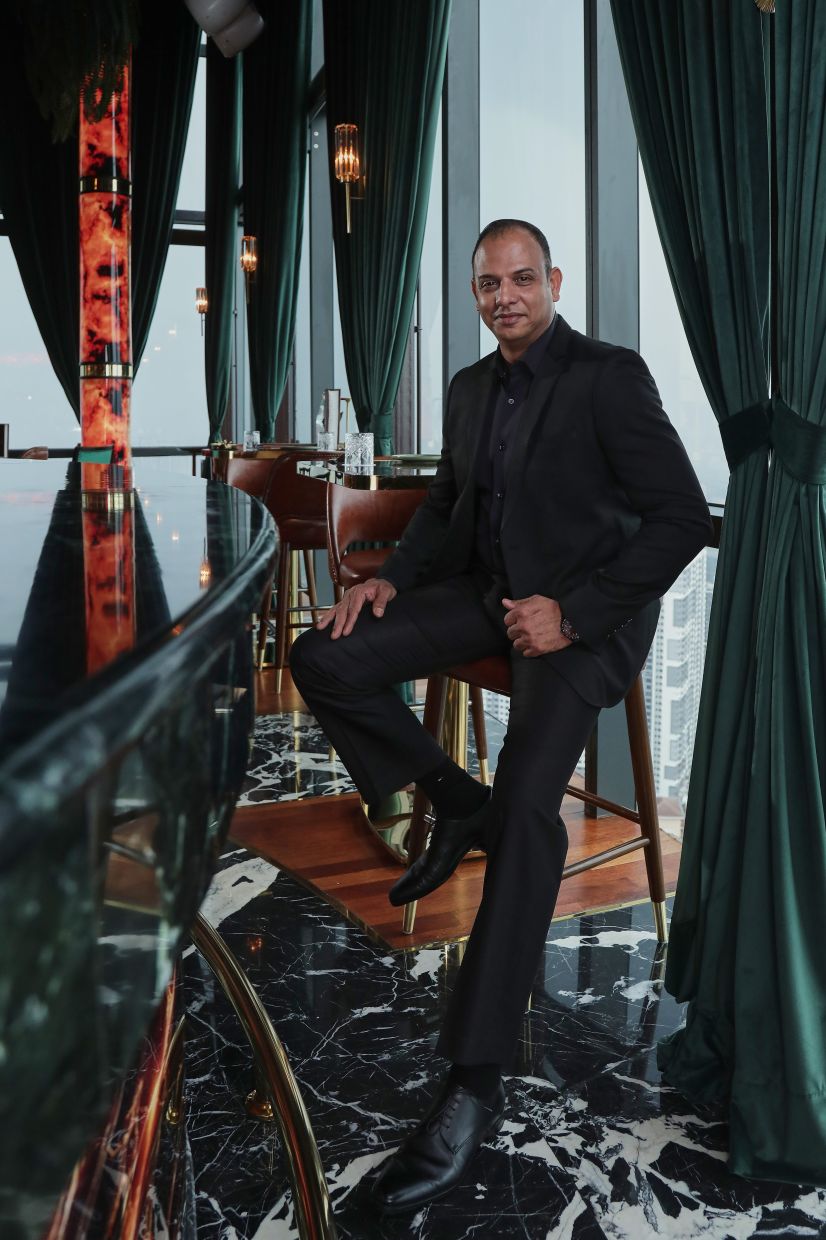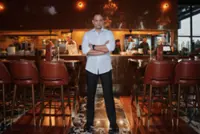Beyond diverse food options, restaurateur Leslie Gomez’s dining spots offer lifestyle-driven experiences. — YAP CHEE HONG/The Star
Fuelled by a passion for cuisine and culture, founder and managing director of The Olive Tree Group Leslie Gomez has brought elevated culinary experiences to cities across Malaysia.
From his humble beginnings in Goa, India, to establishing a thriving company with a diverse portfolio of 31 F&B outlets, Gomez’s ambition seems to know no bounds.
With a stunning view of the Kuala Lumpur cityscape (and Genting Highlands on a clear day), Sol, an upscale dining destination on the 40th floor of The Met Corporate Towers, is the perfect location for our photoshoot and interview with the F&B magnate.
Luxurious interiors and plush furnishings complement the open kitchen, where Gomez has spent many hours with his team refining the dishes that serve as the beating heart of the establishment.
Beyond delicious and diverse food offerings, however, is Gomez’s overarching vision – to curate spaces where people eat, drink, be merry and stay for the “after”.
Sol, a restaurant perfect for anything from work lunches and Friday evening drinks to anniversary dinners and birthday parties is a prime example of this.
“With Sol, we wanted something a little different from the other outlets,” says Gomez. “Anywhere you go, rooftop bars are all about clubbing. We wanted something where people come in, there’s great food and atmosphere, a good view – 50% of people are actually sold on this.”
“How do you make people enjoy the ‘after’ part of it, actually? That’s where understanding booking entertainment comes in. That’s when you need to have a speciality, a kind of pulling power, where people come in, sit down, enjoy a meal and stay back. So, the names who perform on stage have to be big ones,” says Gomez.
Apart from Sol, a bunch of other outlets under the Group have live entertainment, with each restobar offering a variety of local and international cuisine.
Gomez has seen and done it all in the 20-odd years since he took the plunge of starting his own restaurant, Pride of India, in 2003.
Staying relevant in an ever-evolving industry requires deep knowledge of the market and what’s needed, and what’s not, says Gomez.
“I think you have to go according to the times, otherwise you’re left behind. You can see how the market changes, fine dining is slowly dying off. You can see that restrobars are coming into place,” says Gomez.
“In the early 2000s, you would go and eat somewhere, drink somewhere else, and then go clubbing somewhere. And I wanted to change that component to something where everything is under one roof. So you come, eat, drink, enjoy and go back. You don’t have to go to different places.”
Undeterred by obstacles
The journey hasn’t been without its challenges, and there was even a time when Gomez felt like giving up.
When he opened Pride of India in 2003, it took him almost three years to understand the struggles of running an F&B business.
“Getting paid and you having to pay people are two different things. Not everything is rosy. When you start to pay bills, that’s when you understand what business is all about,” he says.
Back in 2020, during the height of the Covid-19 pandemic, Gomez had trouble seeing the light at the end of the tunnel.
“If restrictions had been prolonged another three months, I think that might have been the end of me,” he says.
“As much as you can pull through, taking care of the people around you, the staff, the outlets, your tenants, I never threw in the towel. But then, even when I opened Pride of India, year four and five were extremely bad. Even though you’re breaking even, you start to ask yourself, did I make the right decision in moving out from working for someone to opening up your own place?” says Gomez, who previously worked for the prominent Indian chain The Taj.
Testing times will always be there, but Gomez believes his foundation is strong and he will continue to build on it.
“That’s what we have done. The foundation is built. It’s just submitting ourselves to structure and saying, okay, we can rise when it’s needed.”
These days, he brushes off the suggestion that he has a natural instinct for knowing what the market wants.
“It all depends on where you want to position yourself in the market, actually, I mean, we go in and look at places exactly to see which brand works where, and what cuisine works where. So we try to understand, we work on the economics around the place, what other outlets are offering,” he adds.
Travelling a lot and seeing what’s happening in other countries is a useful way of sussing out what’s what, according to Gomez.
From establishing the identity and concept of a restaurant to working out the type of cuisine offered, F&B is not for the faint of heart, requiring extensive knowledge of the food landscape and catering to different locations – whether it’s housing areas, the city centre, neighbourhood malls or office building – even within one city.
One thing is for sure – Gomez is all for giving customers a bang for their buck.
“I believe in big portions,” he says. “Sometimes you’re paying RM70 or RM80 for a small molecule on your plate, so after you finish that, you think ‘I need to go to the mamak to eat again’,” says Gomez.
“I think it’s just the Asian culture of looking at food, actually. You know, even our own places, our own houses, we always like to have a large variety.”
Despite having various food outlets to choose from, his favourite food remains his mother’s cooking.
“Coconut rice, meatball curry, pork vindaloo, it’s the way she cooks food – mother’s cooking and a chef’s cooking are two different things.”
He claims to not be a very good cook himself, and apart from being able to make a mean mutton briyani, he doesn’t dine in any other outlets apart from those under The Olive Tree Group.
“Except Jalan Alor,” he says, chuckling. “I’m a bit, maybe a bit choosy. Sometimes I become too conscious when I have people around me, I like having time to myself.”
“When I’m out, it’s always in my own outlets. But I have the tendency of going out to test and see how the market is doing. My hobby is working. I enjoy my life. I enjoy walking into an outlet, seeing it do well, and I take a lot of things back with me, sit down, analyse, and come back again.”
Every time he visits one of his restaurants, he sees himself as any regular customer would, taking note of things that can be reworked or tweaked for the better.
“Sometimes, when I receive food, and it doesn’t come out the way I want, it immediately triggers me, you know? So I always tell them (his staff), it’s a daily routine, a daily habit. You can’t go wrong in certain things. There are no shortcuts to success, always do things the right way. Take your time, one or two minutes extra. You don’t lose anything in life.”






